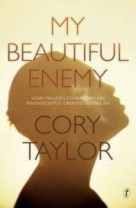There are good reasons this evocative novel about love, obsession and restrained sexual identity — set mainly in an internment camp in rural Victoria during World War II — was shortlisted for the 2014 Miles Franklin Award … so check it out!
What are we talking about? My Beautiful Enemy is the second novel by Australian author Cory Taylor.
Elevator pitch … An Australian guard is smitten by a Japanese prisoner of war but their teenage passion is caught up in enmities between nations and fears about sexuality. Decades later, as the guard reflects on his life, readers are shown just how tragic it can be to live in the shadow of ‘what might have been’.
The buzz … It’s been compared to Merry Christmas Mr Lawrence and Snow Falling On Cedars in its exploration of desire in the context of war. It’s also been praised for its elegant prose, its deft exploration of untold lives from our nation’s past and its haunting depiction of a very private battle.
The talent … Cory Taylor is an award-winning screenwriter who lives in Brisbane. She has published short fiction and children’s books and her first novel, Me and Mr Booker, won the Commonwealth Writers Prize (Pacific Region).
In a nutshell … Arthur Wheeler is a 17-year-old guard in an Australian internment camp for enemy aliens as World War II is drawing to a close. On meeting Stanley Ueno, a young Japanese prisoner of war, Arthur feels ‘converted to a new faith’ — wanting to worship Stanley’s beauty ‘unreservedly’. Arthur’s desire largely remains unfulfilled due to strictures of the times but it haunts Arthur and shapes his life in painful ways.
It’s great that … the novel highlights what it was like for Japanese civilians living out the war in an internment camp in Australia — a relatively hidden history that Taylor explores effectively. Likewise, she charts important territory in detailing what it was like for a young homosexual at that time in the military.
The novel also contains some fine descriptions, including this favourite, in which Arthur describes Matron Conlon’s gait: ‘You could hear her stockings brushing against each other as her thick legs met and separated again. It was like she was walking through a field of corn.’
It’s a shame that … It was really the last few pages of My Beautiful Enemy that made the rest of the journey worthwhile for me. What I mean is: This is an uncomfortable book that took quite a while to grow on me and it was the final pages that seemed the truest and most heartbreaking.
On the way to this point, I thought some scenes were spine tingling while others seemed somewhat less well paced or realised. Gripping scenes included: Arthur going back to the camp to try to find Stanley and sharing a drink with Matron Conlon in the infirmary; several prisoners jumping from the boat that’s about to take them back to Japan; and Arthur’s son trying to get him to be honest about his deep love for Stanley.
Quotes to mull … ‘I think that first Christmas with May and her family marked the beginning of my posthumous life, the one in which I was a new man, unrecognisable even to myself. There was nothing exceptional about this feeling of estrangement, this sense of suspended reality. Every man expecting his first child must feel that his life is about to become unfamiliar and difficult to chart. But added to that there was the sense that the aftermath of the war was likely to be cruel and prolonged … At the same time as I grieved for her [May] I also mourned for my own losses. I waited for news of Stanley like a dog waits to hear the sound of his master’s voice.’
‘I continued to feel, as many people do, that my real life had somehow evaded me, branched off at a crucial juncture and carried on without me in a more rewarding direction.’
You’ll like it if … You like stories that knit multiple perceptions together in exploring disparate ‘truths’. Matron Conlon says that the Japanese soldiers in her care are God’s children too but Arthur dismisses this view. To him it doesn’t explain the savagery of Japanese soldiers he’d read about in the news who liked to behead their captives or swing enemy babies against stone walls to crush their sculls. Later, the school teacher, McMaster, says that the Japanese prisoners at Tatura were being punished for a crime they never committed. ‘Not one shred of evidence was ever found,’ he said, ‘to link any of these people with any act of sabotage or any breach of national security. The crime was ours alone. Worse still it was committed in the name of liberty and justice.’
Why read it? … It’s important to understand that the casualties of war are not restricted to the body count. Arthur suffers because, as a guard and young man at this point in history, he can’t admit to his sexuality or openly pursue his love. Arthur’s wife May suffers because her brother has been killed by Japanese soldiers and Arthur marries her under false pretences. The Japanese civilians in the camps suffer because they are detained without any greater reason than their country is considered a threat to Australia during the Second World War.
The details … My Beautiful Enemy, Cory Taylor , Text $29.99




Recent Comments